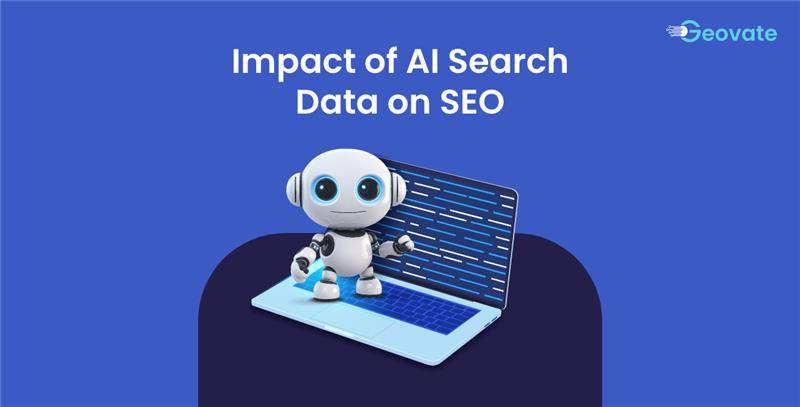New Data Reveals the Unexpected Impact of AI Search on SEO in 2025
Fri,14 Nov 2025 15:05:00- Font Size
- Share Content

AI search isn’t the future—it’s already transforming how brands earn visibility, traffic, and conversions. With Google’s AI Overviews, ChatGPT search, Perplexity, and other answer engines reshaping user behavior, traditional SEO alone can no longer guarantee results.
To uncover the true extent of this shift, we analyzed public search trends alongside Geovate’s GEO (Generative Engine Optimization) tool, which tracks how content appears inside Google AI Overviews and across major LLM search platforms.
What we discovered shows a dramatic reshaping of SERPs, visibility, and organic performance in 2025—and what businesses must immediately do to stay competitive.
Below is the complete breakdown.
1. Google’s AI Overviews Push Organic Results Far Below the Fold
Ranking #1 no longer equals visibility.
Google’s AI Overviews now take up 1,764 pixels on average, often filling an entire mobile screen. Even top-ranking pages end up far below the fold—sometimes requiring multiple scrolls before a user even sees them.
AI Overviews appear before:
- Ads
- Featured snippets
- Local packs
- Organic links
Users are now greeted with a full-screen AI-generated summary built from multiple websites long before they reach the traditional SERP results.
Why this is happening
AI Overviews are designed to satisfy search intent instantly. Users receive accurate, summarized answers within seconds—drastically reducing the need for clicks.
How to Appear in AI Overviews
As AI-driven search becomes the norm, brands are increasingly asking how to appear in AI Overviews and how to rank on AI Overviews. The strategy is no longer about holding the #1 organic position; it’s about earning placement inside the AI-generated summary itself.
To improve your chances of ranking in AI Overviews, optimize your content specifically for AI extractability:
- Use concise, authoritative answer blocks
- Add structured, keyword-rich headings and scannable sections
- Break content into quotable, factual snippets
- Provide accurate, expert-supported statements
These elements help AI models detect, extract, and cite your content more easily—key factors in determining how to rank on AI Overviews.
How Geovate’s GEO Tools Help
Geovate’s GEO tool provides insights into:
- Where your brand appears inside AI summaries
- Whether LLMs (like ChatGPT, Gemini, or Perplexity) cite your URLs
- Which competitors are being referenced instead
- Visibility gaps inside AI-generated answers
Even when GA4 or Search Console shows “zero clicks,” you may still be influencing user decisions directly within the AI Overview—a critical insight when evaluating how to appear in AI Overviews.
2. Organic Traffic Is Dropping 18%–64% Across Industries
AI Overviews affect industries differently. Fields with straightforward, informational queries see the steepest drop in organic traffic.
Industries most impacted by AI Overviews
Industry | % Queries With AI Overviews |
|---|---|
Healthcare | 76% |
Technology | 49% |
Insurance | 45% |
Education | 44% |
AI-generated summaries eliminate the need to visit a website—especially for general advice, comparisons, or definitions.
Most at-risk website types
- Affiliate blogs
- Review sites
- Listicle publishers
- General informational content
AI compresses “Top 10” articles into a single paragraph.
How to measure your risk
With Geovate’s AI traffic analytics, you can track:
- Whether your content appears in AI answers
- How AI frames your brand’s sentiment
- Competitor presence inside AI responses
This reveals invisible influence—even without clicks.
3. AI Overviews Cite Only 3–4 Sources—Mostly Page One Results
Our study shows AI Overviews typically cite 3–4 URLs, heavily favouring high-ranking websites.
Key findings:
- 58% of citations come from existing top-10 results
- Only 15% come from page-two URLs
Content types most likely to be cited
Content Type | Citation Likelihood Ratio |
|---|---|
Government | 11.75 |
Ecommerce | 5.10 |
Support Docs | 3.43 |
News/Media | 2.56 |
Reddit/Quora (UGC) | 1.42 |
What this means
If you’re not ranking organically, AI search will likely ignore your content.
How to boost your citation chances
- Use structured formats (FAQs, how-tos, guides)
- Implement schema markup (FAQPage, HowTo, Product)
- Strengthen internal linking
- Ensure content is fully crawlable (avoid heavy JS)
Traditional SEO is still the foundation—because SERP visibility drives AI visibility.
4. Zero-Click Searches Have Jumped to 58%
More than half of all searches now result in zero clicks as AI-generated answers provide:
- Definitions
- Recommendations
- Comparisons
- Summaries
- How-tos
This reduces traffic dramatically for brands relying on organic conversions.
How to stay relevant
AI prefers content that:
- Solves a problem
- Offers quick, structured answers
- Provides clear comparisons
- Delivers original insights
Optimize for extractability:
- Short paragraphs
- Bulleted lists
- Data tables
- Direct answers
- Multimedia assets
AI often references visual content, giving multimedia-rich pages an advantage.
5. Publishers & Ecommerce Brands Face the Sharpest Declines
Publishers
Listicles and affiliate pages are summarized instantly by AI.
Queries like:
- “Best CRM for recruiters”
- “Top coffee machines under $200”
…rarely generate clicks anymore.
E-commerce
Even when e-commerce URLs are cited:
- AI includes ~5.5 citations per Overview
- 20% of them are e-commerce links
But users don’t always click if the Overview already provides comparisons, benefits, or pricing.
How publishers can adapt
- Create original research
- Add expert insights
- Build deep topical clusters
- Strengthen E-E-A-T signals
How e-commerce can adapt
- Use Product, Offer, Review schema
- Add comparison tables
6. Authority Is Now the #1 Driver of AI Citations
AI systems prioritize trustworthy, authoritative domains to reduce risk.
Top cited sources among 660,000+ SERPs included:
- Government websites
- Help centre/support documentation
- Large e-commerce platforms
- High-authority news outlets
Why?
AI leans on:
- Verified expertise
- Structured, factual content
- Stable domain history
Strong authority increases AI visibility by 88%, while trust signals boost citations by 144%.
How to build authority for AI search
- Add expert bios with credentials
- Use credible external references
- Earn links from trusted websites
- Update content frequently
- Build a comprehensive knowledge base
AI rewards expertise more than ever.
- Include videos and demos
- Get cited by third-party review sites
7. Multimedia & Original Data Are Hard for AI to Replace
AI excels at summarizing public knowledge but struggles with:
- Proprietary research
- Expert commentary
- Original datasets
- Custom visuals
- Real-world experiences
These assets give brands a competitive edge.
Why multimedia wins
Videos, diagrams, and infographics are:
- Difficult for AI to summarize fully
- More engaging for users
- More likely to drive click
- Often referenced by LLMs
Best practices
- Add keyword-optimized video descriptions
- Use timestamps in your videos
- Embed custom visuals
- Publish original research or surveys
8. AI Overviews Now Appear in 47% of All Searches
AI Overviews are no longer experimental—they show up in nearly half of all Google queries.
Industries with highest Overview presence
Industry | AI Overview Coverage |
|---|---|
Healthcare | 77% |
Technology | 48% |
Insurance | 46% |
Education | 45% |
LLMs trigger more frequently for:
- Questions
- Long-tail keywords
- Mid-tail “best of” queries
They struggle with:
- Subjective evaluations
- Nuanced decisions
- Step-by-step visual tasks
This opens content opportunities where AI can’t replace human insight.
9. Citation Chances Drop 4× When You’re Not on Page One
AI search heavily mirrors Google SERPs.
Citation share by ranking position
Position | Citation Share |
|---|---|
#1 | 18.7% |
#2 | 15.8% |
#3 | 13.7% |
#9 | 5.7% |
Moving to page two cuts citation chances by 70%.
Meaning?
SEO is not dead—it’s now essential for AEO.
To appear in AI:
Ranking + Structuring for extraction = AI visibility
10. Domain Authority & Long-Tail Keywords Are the New Gatekeepers
AI citations heavily favour high-authority websites.
- DR 88–100 → 6,000+ citations
- DR <63 → almost invisible
AI Overviews are triggered most by:
Keyword Type | Trigger Rate |
|---|---|
Long-tail queries | 35% |
Question keywords | 25.6% |
Short-tail | 9.5% |
Single-word | 5.4% |
Winning in AI search requires intent-driven long-tail optimization.
SEO Isn’t Dead—But SEO Alone Isn’t Enough
To dominate search in 2025, brands must optimize for both:
1. SEO
For rankings, authority, and crawlability.
2. AEO (Answer Engine Optimization)
For visibility inside AI-generated answers and Overviews.
Geovate supports both with:
- SEO tools for keyword research and content optimisation
- GEO tool for tracking visibility across AI platforms
- Competitor citation analysis
- AI search performance monitoring
AI isn’t replacing SEO—it’s evolving it.
Final Thoughts
If your SEO strategy still focuses only on rankings and clicks, you’re already behind.
2025 requires a dual approach:
- Traditional SEO to stay visible in SERPs
- AEO to appear inside AI-generated responses
- Authority-building to earn trust
- Unique research and multimedia to remain irreplaceable
- Long-tail keyword focus to align with AI triggers
Brands that adapt will thrive.
Brands that don’t will disappear, even if they remain on page one.
